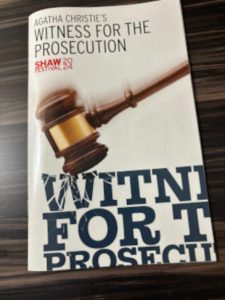
Witness for Prosecution At The Shaw Festival
The Shaw Festival is taking its first whack at Agatha Christie’s old chestnut Witness for the Prosecution (they’ve mounted several others over the years) and under the schizophrenic direction of Alistair Newton it is something of a puzzlement.
Witness for the Prosecution is a talky period piece and like so many of Christie’s works it contains a scarcely believable “twist” ending, so it’s only natural that a director would make some effort to ameliorate its flaws while enhancing its strengths.
Unfortunately, Newton’s mantra seems to be “Why go for subtlety when you can use a sledgehammer?” Far too many of his choices betray a lack of faith in the material and while those stylistic tics can occasionally be arresting, the results are disappointing. I found it telling that, in his cast bio, Newton cites as a mentor Peter Hinton-Davis, another director prone to making odd directorial choices.
Witness for the Prosecution tells the tale of Leonard Vole (Andrew Lawrie), an allegedly handsome but impecunious young man accused of murdering a 56-year-old woman described in the text as “elderly,” a revelation that got a solid laugh from Shaw’s geriatric regulars. Shortly before her death, she changed her will, making Vole her sole heir.
He proclaims his innocence and his alibi hangs on the testimony of his wife, Romaine (Marla McLean) a former German actress. Vole met her while serving in postwar Germany and spirited her out of the Russian sector by marrying her.
The sets (including a splendidly imposing grey courtroom by Karyn McCallum, moodily lit by Siobhán Sleath) and costumes (Judith Bowden) evoke the black and white films of the postwar era. Lyon Smith’s lush cinematic score is straight out those neighborhood movie palaces of your youth. (Well, my youth at least.) So far so good.
Then, when the police arrive to arrest Vole, they are decked out in oversize fedoras and greatcoats, making them look like a send-up of an old gangster movie. This touch drew another laugh.
But this Witness for the Prosecution really goes off the rails when Romaine enters the courtroom dressed to the nines in slinky dresses in bright primary colors, with hats to match, brandishing a long cigarette holder, and pausing briefly to strike a pose for the audience. She looks for all the world like a femme fatale out of the old Terry and the Pirates comic strip.
Her dresses (well executed by Bowden and carried well by McLean) change from green to yellow to red on subsequent entrances. Is this some sort of traffic light metaphor? And aren’t the Voles supposed to be strapped for cash? Leonard, after all, is unemployed.
The real misstep here, however, is to signal in the most blatant way possible that we must look to Romaine for the trick ending every Christie fan is expecting.
In some ways, Newton seems to want this Witness for the Prosecution to be a good old-fashioned courtroom drama like those rock solid films from England’s underrated postwar noir period.
The legal eagles on the case – the splendid Patrick Galligan for the defense, ably abetted by Kristopher Bowman, and the equally adept Graeme Somerville for the prosecution – are quite good indeed. These accomplished actors turn in performances of heightened realism that go a long way to make the talky courtroom scenes compelling.
And McLean as the duplicitous Romaine can handle even the most ill-advised directorial conceit and come out on top.
The rest of Witness for the Prosecution, alas, is a mishmash. Some of the casting is unfortunate and some of the performances overwrought to the point of parody. Accents wander across the British Isles. Minor characters are given comic bits that are not amusing.
The play’s final image, courtesy of the projections of McCallum, is an absolute hoot, but it is much too much of a muchness and a serious misstep.
It’s too bad. For all its creakiness, Christie’s Witness For The Prosecution has some interesting things to say about her culture’s attitudes toward women (not mention “foreigners”), attitudes that still flourish in the less enlightened corners of society.
There is no doubt a way to bring those themes to the fore in a way that would satisfy the diktats of today’s gender and culture warriors without making Christie’s play into a garish cartoon, but Newton has not found it.
Witness for the Prosecution continues at the Royal George Theatre in Niagara on the Lake through October 13, 2024. For more information and to purchase tickets, visit the Shaw Festival website.
For a complete index of reviews CLICK HERE.
Don’t miss another review or blog post! SUBSCRIBE HERE.

